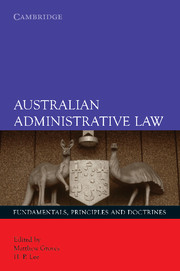Book contents
- Frontmatter
- Contents
- Foreword
- Preface
- About the contributors
- Table of cases
- Table of statutes
- 1 Australian administrative law: The constitutional and legal matrix
- 2 Administrative law in Australia: Themes and values
- 3 The public/private distinction in Australian administrative law
- 4 Australian administrative law: The human rights dimension
- 5 Administrative tribunals
- 6 Australian Ombudsman: A continual work in progress
- 7 Freedom of information
- 8 Delegated legislation
- 9 The concept of ‘justiciability’ in administrative law
- 10 Standing
- 11 Reasons for administrative decisions: Legal framework and reform
- 12 Relevant and irrelevant considerations
- 13 Improper purpose
- 14 Reasonableness, rationality and proportionality
- 15 The ‘no evidence’ rule
- 16 Failure to exercise discretion or perform duties
- 17 Procedural fairness: The hearing rule
- 18 The doctrine of substantive unfairness and the review of substantive legitimate expectations
- 19 The impact and significance of Teoh and Lam
- 20 The rule against bias
- 21 Jurisdictional error without the tears
- 22 Privative clauses and the limits of the law
- 23 Administrative law judicial remedies
- Endnotes
- Index
16 - Failure to exercise discretion or perform duties
Published online by Cambridge University Press: 05 June 2012
- Frontmatter
- Contents
- Foreword
- Preface
- About the contributors
- Table of cases
- Table of statutes
- 1 Australian administrative law: The constitutional and legal matrix
- 2 Administrative law in Australia: Themes and values
- 3 The public/private distinction in Australian administrative law
- 4 Australian administrative law: The human rights dimension
- 5 Administrative tribunals
- 6 Australian Ombudsman: A continual work in progress
- 7 Freedom of information
- 8 Delegated legislation
- 9 The concept of ‘justiciability’ in administrative law
- 10 Standing
- 11 Reasons for administrative decisions: Legal framework and reform
- 12 Relevant and irrelevant considerations
- 13 Improper purpose
- 14 Reasonableness, rationality and proportionality
- 15 The ‘no evidence’ rule
- 16 Failure to exercise discretion or perform duties
- 17 Procedural fairness: The hearing rule
- 18 The doctrine of substantive unfairness and the review of substantive legitimate expectations
- 19 The impact and significance of Teoh and Lam
- 20 The rule against bias
- 21 Jurisdictional error without the tears
- 22 Privative clauses and the limits of the law
- 23 Administrative law judicial remedies
- Endnotes
- Index
Summary
Administrative decision makers may be given a discretionary power under a statute or required to perform a duty. Of these two, the law relating to the exercise of a discretionary power has been the greater subject of substantial jurisprudence and academic commentary. The central debate in this context is the extent to which administrative law should constrain the exercise of discretion – that is, how to achieve a balance between ensuring that decision makers consider the merits of individual cases, whilst also recognising the bureaucratic imperatives of consistency and efficiency. In this respect, this topic presents a challenge for administrative law which must (to some extent at least) reflect the political reality of administrative decision-making, whilst also ensuring that decisions are made lawfully.
The common thread in the jurisprudence in this area is that a decision maker granted power by Parliament under a statute must be the person to make the decision. Thus he or she cannot fetter that discretion, improperly delegate to another or, if a duty is applicable, fail to perform that duty. Before discussing the grounds for judicial review which arise in this respect, it is necessary to discuss the meaning of the term ‘discretion’ in administrative law and to set the grounds in their political context.
The meaning of discretion
The term ‘discretion’ indicates the existence of a level of choice in making a decision and is usually expressed by use of the word ‘may’ in a statutory provision.
- Type
- Chapter
- Information
- Australian Administrative LawFundamentals, Principles and Doctrines, pp. 253 - 264Publisher: Cambridge University PressPrint publication year: 2007



